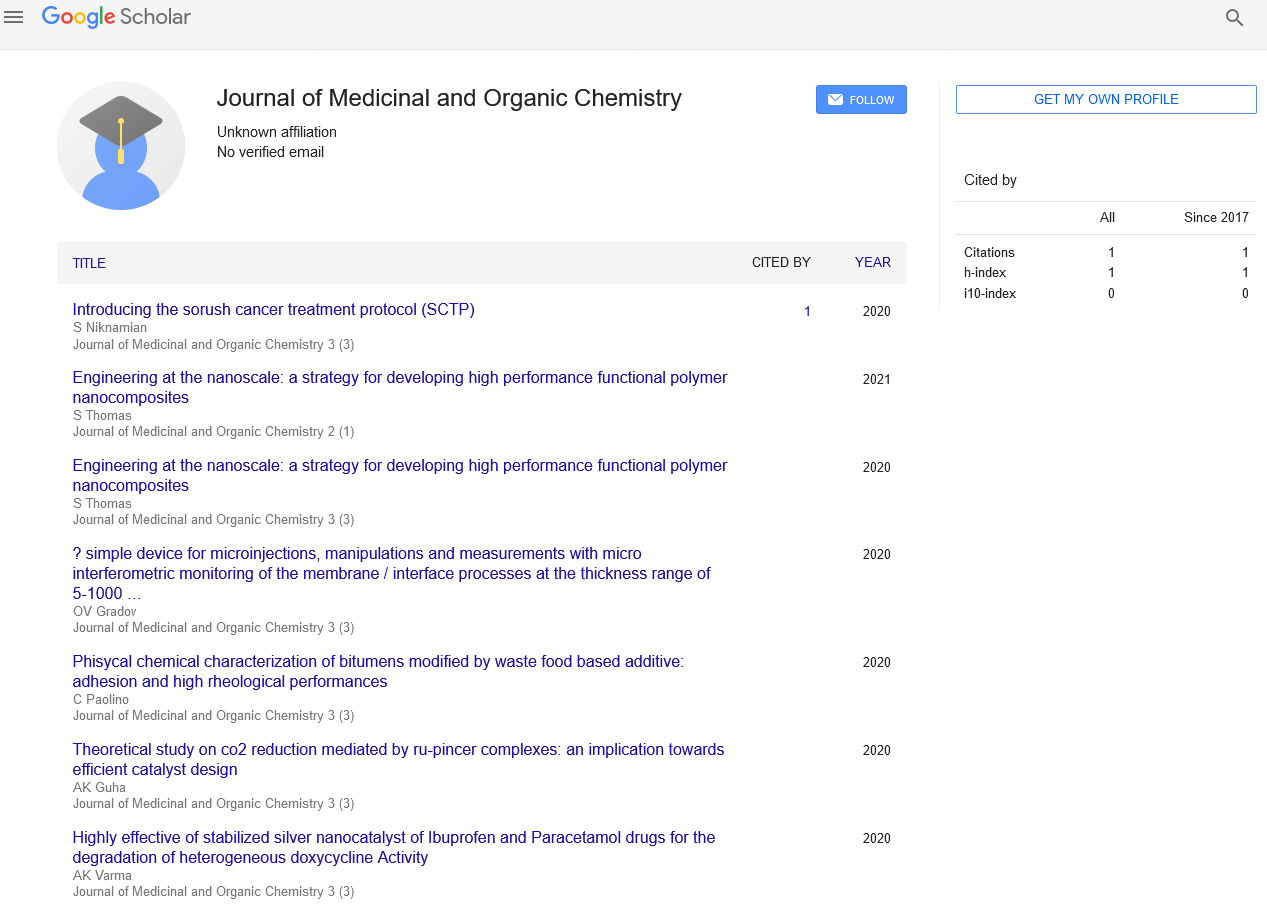Perspective - Journal of Medicinal and Organic Chemistry (2023) Volume 6, Issue 5
Clinical Practice: Bridging Science and Compassion in Healthcare
- Corresponding Author:
- Teodor Zidaru
Department of Anthropology,
London School of Sciences,
London,
United Kingdom
E-mail: ku.ca.esl@ucselub-uradiz.m
Received: 15-Sep-2023, Manuscript No. JMOC-23-118881; Editor assigned: 20-Sep-2023, PreQC No. JMOC-23-118881 (PQ); Reviewed: 04-Oct-2023, QC No. JMOC-23-118881; Revised: 19-Oct-2023, Manuscript No. JMOC-23-118881 (R); Published: 27-Oct-2023, DOI: 10.37532/jmoc.2023.6(5).135-136
Introduction
Clinical practice is the heart of healthcare, where the art of medicine meets the rigor of science to provide patients with the best possible care. It’s a dynamic and evolving field where healthcare professionals use their knowledge, skills, and compassion to diagnose, treat, and support individuals on their journey to better health. In this we will explore the multifaceted world of clinical practice, including its core principles, challenges, and the critical role it plays in the wellbeing of patients.
Description
The essence of clinical practice
At its core, clinical practice is the application of medical knowledge and skills to diagnose, treat, and prevent illness. It encompasses a wide range of healthcare professions, from physicians and nurses to therapists and technologists. While the specifics may vary across disciplines, clinical practice shares several common elements:
Patient-centered care: The patient is at the center of clinical practice. Healthcare professionals work with patients to understand their needs, concerns, and preferences, involving them in the decision-making process.
Communication and empathy: Effective communication a nd empathy a re essential skills in clinical practice. Healthcare professionals must convey complex medical information in a way that patients can understand and provide emotional support.
Interdisciplinary collaboration: Healthcare is a team effort. Different healthcare professionals collaborate to ensure comprehensive care for patients, considering both medical and psychosocial aspects.
Continuous learning: The field of healthcare is constantly evolving. Clinical practitioners engage in lifelong learning to stay current with the latest medical advances and technologies.
Challenges in clinical practice
Clinical practice is not without its challenges, some of which are inherent to the field, while others are influenced by external factors:
Medical errors: Patient safety is paramount in clinical practice, but medical errors can still occur. These errors may result from miscommunication, system failures, or individual mistakes.
Healthcare disparities: Disparities in healthcare access and outcomes persist, often due to socioeconomic, racial, or geographic factors. Clinical practitioners must address these disparities to ensure equitable care.
Technology integration: While technology has revolutionized clinical practice, integrating electronic health records and other digital tools into workflows can be challenging and timeconsuming.
Regulatory and administrative burdens: Healthcare professionals are often burdened by administrative tasks, such as insurance paperwork and compliance with regulatory requirements.
Moral and ethical dilemmas: Clinical practitioners may encounter moral and ethical dilemmas, such as end-of-life decisions, organ transplantation, and genetic testing, which require careful consideration.
Clinical practice and the patient experience
Clinical practice profoundly impacts the patient experience. Patients rely on healthcare professionals not only for medical expertise but also for guidance, support, and empathy during times of illness and vulnerability. Several key elements contribute to a positive patient experience:
Communication: Effective communication is essential for building trust and ensuring patients understand their diagnoses, treatment options, and care plans.
Shared decision-making: Involving patients in their care decisions empowers them to make choices aligned with their values and preferences.
Cultural competence: Recognizing and respecting cultural differences and beliefs is crucial to providing patient-centered care.
Safety and quality: Patients expect safe and highquality care. Clinical practitioners play a pivotal role in ensuring that medical procedures are performed accurately and that healthcare settings are clean and safe.
The role of technology in clinical practice
Technology has transformed clinical practice in various ways, enhancing patient care, diagnosis, treatment, and communication. Some of the key technological advances include:
Electronic Health Records (EHRs): EHRs have streamlined the storage and retrieval of patient information, making it easier for healthcare providers to access medical histories, test results, and treatment plans.
Telehealth: Telehealth has opened new avenues for patient care, enabling remote consultations, monitoring, and follow-up appointments. This has been especially valuable during the COVID-19 pandemic.
Medical imaging: Advanced medical imaging technologies, such as MRI, CT scans, and ultrasound, provide detailed views of the body’s internal structures, aiding in diagnosis and treatment planning.
Genomic medicine: The ability to sequence an individual’s genome has revolutionized the field, allowing for personalized treatment plans based on genetic information.
Robotics: Surgical robots assist in performing complex surgeries with precision, reducing the invasiveness of procedures and shortening recovery times.
Artificial Intelligence (AI): AI is increasingly used for diagnostic support, treatment recommendations, and data analysis, helping healthcare professionals make more informed decisions.
The future of clinical practice
The future of clinical practice is filled with promise and challenges. Emerging trends and areas of focus include:
Precision medicine: Tailoring medical treatment to individual patients based on their genetics, environment, and lifestyle is a growing area of interest.
Telemedicine: The expansion of telehealth and remote monitoring is likely to continue, offering greater accessibility to healthcare services.
Interdisciplinary collaboration: Collaboration among different healthcare disciplines will increase, ensuring comprehensive care for patients.
Preventive care: A shift toward preventive care and early intervention to reduce the burden of chronic diseases is on the horizon.
Conclusion
Clinical practice is the heart and soul of healthcare, where science and compassion converge to improve the lives of patients. Despite its challenges, clinical practice continues to evolve, embracing technology and patient-centered care to provide more personalized, accessible, and effective healthcare. As the healthcare landscape transforms, clinical practitioners remain the guiding light, dedicated to the well-being and healing of their patients, embodying the essence of healthcare’s noble mission.

